It Can Happen Here
It is a tremendous feeling coming in to work each morning knowing that you are doing work that is urgent. Work that is responsive to a critical moment or issue in the lives of your audience and in your own. Work that marries your desire to make change with your desire to make art.
Tony Taccone is feeling all the feelings right now.
I caught up with the Artistic Director of Berkeley Rep the morning after the second preview of his adaptation of Sinclair Lewis’ It Can’t Happen Here. This 1935 novel showed the nation how fascism would come to America: “Not through the barrel of a gun, but through the ballot box.” Lewis was trying to awaken the nation to the dangers of the rise of the Nazis in Germany and Mussolini in Italy, and how such a contagion could spread to this country. At the time, the novel seemed “ripped from the headlines.”
Between the planning timelines (which can be years long) and the drawn-out process that characterizes new play development in our producing theatres, the meeting of the social moment and the artistic content of a play is generally more of a happy accident of convergence than a plan.
But in a strange twist, he seems to actually have been eighty years ahead of himself. Lewis was apparently speaking to the conditions of the 2016 election. In 1936, Franklin D. Roosevelt won re-election in a landslide. The prototype for Lewis’ demagogue, the populist blowhard bully Huey Long, was assassinated before the 1936 campaign even began. Now, however, the demagogue-du-jour is in a dead heat with only weeks to go until the general.
I shared with Tony my surprise that this production had come about so quickly. They had only begun work on the script in the spring, after the Super Tuesday trouncing Trump delivered the establishment Republicans. Institutional theatre has struggled to be “on point” for years, particularly the larger companies. Between the planning timelines (which can be years long) and the drawn-out process that characterizes new play development in our producing theatres, the meeting of the social moment and the artistic content of a play is generally more of a happy accident of convergence than a plan.
There are also the attendant dangers in taking sides in a moment like this. While there are very real constraints for all non-profits in engaging in direct political action or advocacy, there are more subtle and shadowy pressures exerted by donors, corporate sponsors, and Boards when it comes to taking a stand in something so polarized as this election.
Taccone and his Berkeley Rep team have plowed ahead, mostly following a gut sense that to stay out of it was not an option. “I was walking into the building in February and I just thought ‘I’ve got to do something,’” he recently told me. “And [director] Lisa Peterson sent me this title—she had googled the phrase and come upon Lewis. I started reading the novel and it was all there...”
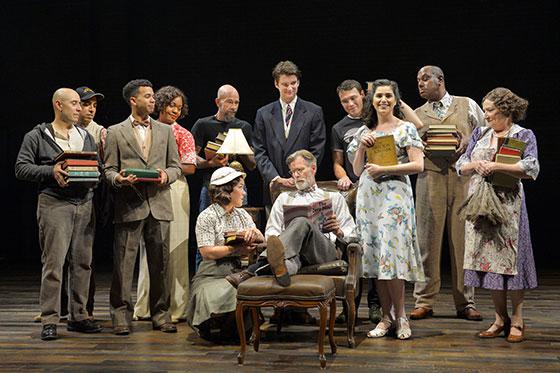
Photo courtesy of Kevin Berne/Berkley Repertory Theatre.
By way of contrast, people of a certain age will remember the shocking rush of immediacy that Tony Kushner’s Homebody/Kabul held when it started landing in theatres around the country just months after 9/11. In it, an enraged Afghani woman tells the American travelers, “You love the Taliban so much, why don’t you bring them to New York?…Well, don’t worry. They are coming to New York.” Homebody/Kabul had been in development for years when the planes hit the towers.
Taccone had announced Homebody as part of his 2001/02 season long before the attack. He was proud of his theatre then, as he is now, for having had the courage to step into the heat of radical relevance. There’s a different vibration around him today, though, as It Can’t Happen Here begins performances. He’s not just an Artistic Director who programmed a production that spoke to a moment this time around. He’s the co-author of the adaptation. And this is not a play that the times have miraculously (and devastatingly) caught up with. This is a play that is pacing the times. In production, Homebody was offering a bit of insight into a recent national tragedy. It Can’t Happen Here is trying to prevent one. He says,
I thought it was important that I put myself in it in a real way. That I be accountable for it, very directly. I was asking the organization to do something incredibly challenging—we announced this in April and had no script, no sense of where the election was heading, and no idea what we’d be wanting to say about it by fall. And nobody expected to be where we are now.
Is the playwright more accountable than the director? Taccone’s had a long career as a director and could have easily taken that role here if he wanted to be “in it.” Why playwright, instead?
Well, there was a play version of this written for the Federal Theatre. But it was terrible. Just awful. For, like, twenty-four hours we thought about doing a production of it where the actors read the script aloud and talked with the audience about why they were doing such a bad script.
That version of the play has a story all its own. Adapted by Lewis and John C. Moffitt, the two writers got into such a terrible fight over the adaptation that they refused to be in the same room or to speak to each other. They had to stay on separate floors of the hotel and pages had to be shuttled back and forth between the two. Though the result was a truly rickety script, the Federal Theatre Project famously produced it anyway. Twenty-one simultaneous productions opened in seventeen cities around the country, in five languages, with all the curtains rising as one on October 27, 1936. By election day, two weeks later, over 100,000 people had seen the play. Congress was so spooked by this demonstration of the Federal Theatre’s power to reach nationwide with a political work that they began a campaign to defund the entire program. The Congressional committee that held the famous hearings that led to this outcome would become more widely known in later years as the House UnAmerican Activities Committee. (Read FTP director Hallie Flanagan’s spirited account of this story in her inspired autobiography Arena: The Story of The Federal Theatre Project. The film The Cradle Will Rock covers this territory briefly as well.)
“When we discarded that 1936 play, there we were coming into the summer without a script for a production that was going to open our season,” Taccone told me. “I was stepping into that gap as the writer, taking accountability for that particular insanity. Not just the production, but the process of its creation.” His co-writer here is Bennett S. Cohen.
While the original play is so dated and loopy as to be irredeemable now, the novel itself is so on point with this election it is equal parts thrilling and appalling. I won’t take your time to detail the precision with which Lewis prefigured the rise of Donald Trump. Suffice it to say, he’s got it pegged to a scary degree, right down to the fatuousness of the stump speeches that sound like literal quotes from the campaign trail this season, the rallying around him of the political establishment of the party he’s overtaken, the violence that attends his appearances, and the impotence of the media in his presence. Perhaps most alarming is the picture Lewis paints, and Taccone and his collaborators highlight, of the aftermath of such an election. Yes, there are the fascistic accouterments of the sort many are warning about now, but there is also something more insidious. Lewis’s Trump, called Buzz Windrip, turns out to be an unwitting puppet. Once in office, he is quickly discarded by the dark army that has enabled him, in favor of someone more temperamentally manageable and fully committed to their fascist agenda. Elect your Windrip puppet, he’s saying, and watch the puppet’s masters come out of the shadows.
Berkeley’s production led me to wonder: Why are all the political leaders in the party of the 2016 Buzz lined up behind him? Why are these surrogates stumping for him? With all the scandals and potential illegal activities in Trump’s portfolio, how long would it even be before a President Trump would be impeached or in jail and we’d inaugurate President Pence? Lewis seems to think it will be a matter of months. Could Pence or his agenda have ever won the White House outright? Unlikely. Best to let the loudmouthed clown lead the parade and have him hold the door open for you.
And just recently, five weeks from the election, the cable news outlets started openly speculating that whichever candidate wins, there will be articles of impeachment filed in Congress on Inauguration Day.
It Can’t Happen Here is not just pacing the election, it’s predicting its aftermath.
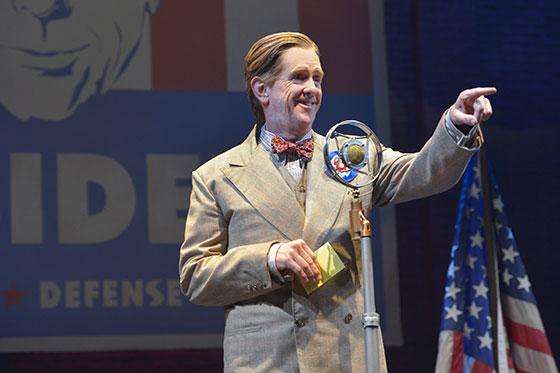
Photo courtesy of Kevin Berne/Berkley Repertory Theatre.
Of course, Berkeley Rep is in the People’s Republic of Berkeley. The anti-Trump message isn’t going to be ruffling many feathers here. But still, the unambiguous voice of the play in the heat of the moment is unusual in a theatre of this size.
“I know it’s a bit safer to be doing this here,” Taccone acknowledged. “But I wanted to be coming into work every day doing something that directly addressed this awful situation we’re in as a country. I asked everyone here to read the book. And to a person, our staff said, ‘let’s do this.’”
And the audience? “I inserted just a few moments from this campaign. They are easily recognizable and in those moments we are all in on it. I wanted the audience to feel themselves in it as well—part of it, and with responsibilities. And Lisa Peterson’s staged those moments of full immersion that the audience just goes with. They are cheering and booing right along with the mindless minions in Lewis’ rallies.”
It Can’t Happen Here is not just pacing the election, it’s predicting its aftermath.
I wondered aloud why it seemed so unusual for a theatre of this size to be taking such an unguarded and timely risk—to be taking a stand like this at a moment like this. “I think we’ve been distracted, in general, me and my colleagues,” Taccone answered. “There’s so much energy spent thinking about the economics of theatre, the market, the commercial potential of things. At this point, I’ve only got so much time left. And it’s like ‘Dude—what are you going to do with it?’”
Taccone and I are both grandfathers now. I mentioned that, for me, my granddaughter’s arrival has been a profound reminder of the work left undone. He agreed: “Oh, exactly. I think my generation thought we were farther along with all this stuff. Feminism. Race. Class politics. The environment. But I see where we are right now and what that generation is inheriting from me and I just couldn’t stay sidelined.”
It’s tempting to be cynical about the impact of staging this play in the cradle of progressive political thought that is Berkeley, California. Given the evident hazard of “preaching to the choir,” it’s impressive that Berkeley Rep has taken extra steps to reach beyond Berkeley with this adaptation of It Can’t Happen Here. The Rep is attempting to catalyze a nationwide reading of the play on October 27th, 2016, to commemorate the achievement of the Federal Theatre. And like that evening in 1936, it will be two weeks from the day we go to the polls. Want to join the chorus? The details are right here.
The play hasn’t opened to the press at this writing and it remains unclear what sort of impact it will have in its place and time. But there’s an honest effort here, made by a major theatre, to take a stand against what many have called “a clear and present danger.” It’s invigorating to see it and, to judge by the effervescent energies of Taccone and his creative team, to be making it as well.

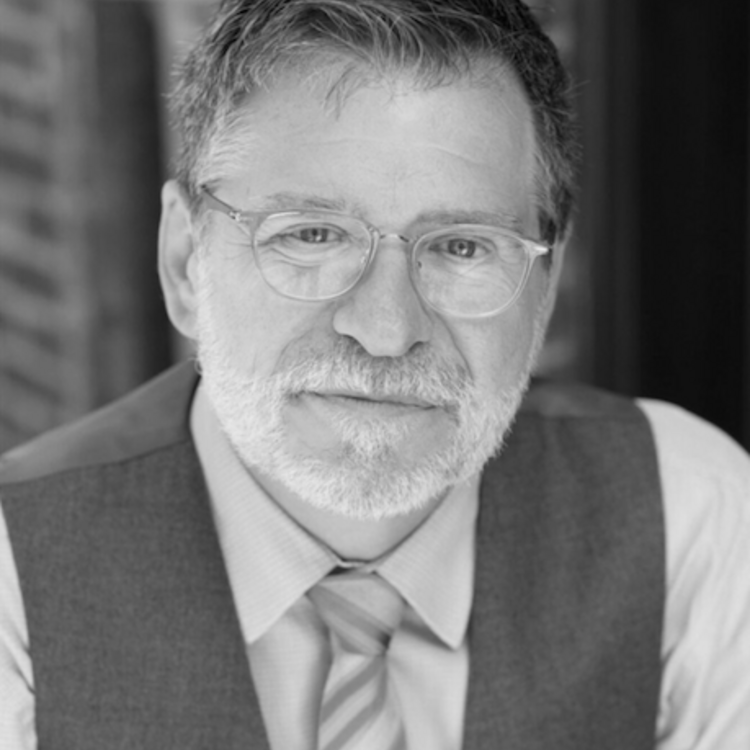
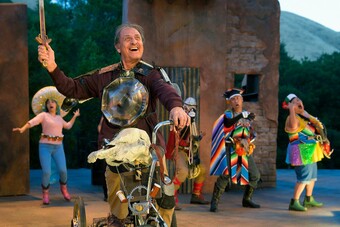



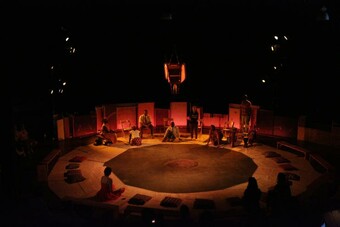

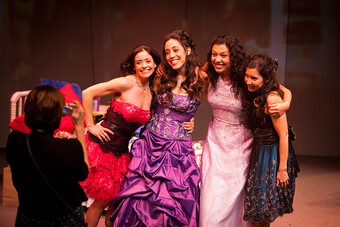



Comments
The article is just the start of the conversation—we want to know what you think about this subject, too! HowlRound is a space for knowledge-sharing, and we welcome spirited, thoughtful, and on-topic dialogue. Find our full comments policy here
David -- Thanks for this great article. I was actually involved in a prior original production of "It Can't Happen Here" in the early 1990's in San Francisco with the Z Collective. You probably remember it (you were the director). At that time, with the first Clinton in the White House, Lewis' pamphlet play seemed more abstract, purely cautionary. Today, it's much more like an actual threat.
David, thanks for this article and the reminder that theater has the potential and ability to 'connect the dots' between past and present, to reframe a situation, and to help us to really see a larger reality. Looking at the list of where the simultaneous readings are taking place, I'm wondering why there is no reading being done in Boston???
Fascinating article!
I think the most vital point made is that Pence would be even worse than Trump. For this is quite opposite of what we're hearing the last couple of days in the mainstream media, which is basically praising Pence for being so calm in the VP debate and pointing out that there is no way anybody could have defended Trump against all the points that Kaine made (about what a bad person Trump is).
But what struck me (having watched the entire debate live before hearing what any commentors had to say about it) was how much more of a typical war-mongering neocon republican Pence is that Trump. Pence went out of his way to talk about how bad Russia is, how we need to spend yet even more money on the military (isn't 500 billion a year enough?!), and so forth.
Yet nowhere in this article (or in "It Can't Happen Here") is there an analogy to one of the most important aspects of the current election: That HRC actually has much in common with Pence, in terms of how she constantly talks about how bad Russia/Putin is and how the US has to stand up to him, starting with implementing a no-fly zone over Syria (which could easily lead to World War III). In fact, many prominent neocon republicans have said that they are going to vote for her.
I'm thus concerned that there seems within the theatrical community to be such unabashed enthusiam for HRC. I'd be more confortable if people realized that she is (at best) only a slightly better risk than Trump. (By the way, it's not a gender issue -- I was one of the many who signed a petition last year urging Elizabeth Warren to run. But from what we have learned in recent months about how the DNC and Wasserman was so biased against Bernie I think it's quite probable that the DNC also put tremendous pressure on Warren not to run.)
Even HRC's hometown newspaper, the Chicago Tribune, has refused to endorse her -- or Trump -- suggesting that people rebuke both major parties by voting for a third party. Unless you live in one of the handful of battleground states where your vote could really affect the election* (Illinois is NOT one of them), I tend to agree.
*ICYF [In Case You Forgot]: Most of us live in states that virtually always vote one way or another in the Presidential election. For instance, here in Illinois the last six elections (24 years) have always voted for the democrat. Thus my vote will almost certainly not affect who wins the state (and thus the election), but only the "popular vote" (which except for bragging rights, is meaningless).
a beautiful article, David, right at the heart of how theater and social justice can converge and energize. Even in Berkeley, where "undecided" is a risible voting option, a play such as this illuminates current events through the frighteningly clear light of history.